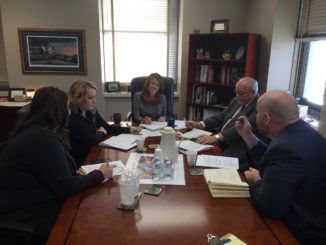
Last week we published an article explaining some reasons we support the elimination of the property tax. As part of that article, I mentioned that the state already uses a formula to fund K-12 education that nobody really seems to question or complain about. North Dakota’s children get an education as a result of it.
Over the weekend, I came across a document from the North Dakota Department of Public Instruction (DPI) explaining a bit about the K-12 funding formula. Contained in that document is this statement:
“In the end, North Dakota’s K-12 funding formula provides a base of financial support per student sufficient to provide an adequate education by school districts, regardless of where the student lives or what the taxable valuation is of the district.”
Pay very close attention to those words in bold. According to this document, the “base” of funding that the state allots for K-12 education is “sufficient to provide an adequate education” for students. This is “regardless of” the “taxable valuation” in each district. Does this mean that anything beyond the base is gravy? Does it mean property taxes aren’t needed to fund K-12? This appears to be the case.
If this is what the statement above indicates, it’s no surprise to us. At the end of December, we published in article in which I pointed out that from 2006 to 2016 K-12 funding nearly doubled, while enrollment had increased just 13% over the same period. And in that same article, we pointed out that a document prepared for the current interim Government Finance Committee shows that:
“…the state would only have to return to the K-12 funding level of [2010 – 2011] in order to cover the combined total of local, county, and state resources at $943,350,078. And if they chose to fund it at the 2015 – 2016 state funding level, it would still represent a funding increase of over 30% in comparison to 2006 – 2007… without raising taxes!“
So, can the state fund K-12 education 100% without property taxes? Absolutely. And it’s my firm belief that they wouldn’t even have to raise other taxes to do it. In fact, there’s more than one way they could accomplish this. Having said that, could other taxes be raised as a means of “replacing” lost property tax revenue? Yes. But it’s simply not necessary.
When the state increased its funding of K-12 from 47% to about 75%, was there an outcry? Nope.
When the state completely took over funding of local social services last Legislative Session, was there an outcry? Nope.
Is there an outcry over funding formula’s in general? Nope.
Are there funding formula’s written into the state constitution for either of these or anything else? Not that I’m aware of.
What all of this shows is that not only is it possible to end property taxes, but that funding mechanisms and formulas are already in place that prove the capability exists to provide desired services. Yes, it’s true… the sky really won’t fall.
So, why do some people lose their minds at the thought of eliminating property taxes? Why do they think it’s so impossible to put into place replacement funding mechanisms– especially when such things have been done before? And why do these same people cry for something they didn’t cry for in relation to these other issues– namely that a funding formula be written into the State Constitution?
In the aftermath of abolishing property taxes, the choices boil down to this for “replacing” the “lost revenue” to pay for it– either we reduce the size of government or equalize the tax burden. I prefer the former, but either way is better than the current atrocity that plagues every property owner in the state of North Dakota.
Sources:
- https://theminutemanblog.com/2018/02/01/some-reasons-we-support-eliminating-property-taxes/
- https://www.nd.gov/dpi/uploads/146/StateAidFormulav2.pdf
- https://theminutemanblog.com/2017/12/28/is-property-tax-an-unconstitutional-funding-mechanism-for-education/
- http://www.legis.nd.gov/files/resource/committee-memorandum/19.9130.02000.pdf





